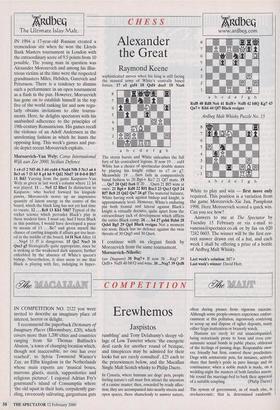COMPETITION
Erewhemos
Jaspistos
IN COMPETITION NO. 2122 you were invited to describe an imaginary place of interest, horror or delight.
I recommend the paperback Dictionary of Imaginary Places (Bloomsbury, £20), which covers more than 1,200 cities and countries ranging from Sir Thomas Bulfinch's Abaton, 'a town of changing location which, though not inaccessible, no one has ever reached',, to Sylvia Townsend Warner's Zuy, an Elfin kingdom in the Netherlands whose main exports are 'musical boxes, marrons glace's, starch, suppositories and religious pictures'. I enjoyed Adrian Fry's gourmand's island of Consumptia where `the old squat in their huts, corpulently guz- zling, ravenously salivating, gargantuan guts rumbling' and Tony Delahunty's sleepy vil- lage of Low Tusseter where 'the energetic deal cards for another round of bezique, and timepieces may be admired for their looks but are rarely consulted'. £25 each to the prizewinners below, and the Macallan Single Malt Scotch whisky to Philip Dacre.
In Cynuria, where humans are dogs' pets, people feeling nature's call must first attract the attention of a canine master; then, rewarded by ready affec- tion, they are accompanied into nearby streets and open spaces, there shamelessly to answer nature, often during pauses from vigorous exercise. Although some people-owners experience embar- rassment at this pollution, ingeniously contriving to scoop up and dispose of uglier deposits, many either feign inattention or brazenly watch.
Humans are rarely let out unaccompanied, being notoriously prone to form and even con- summate sexual bonds in public places, oblivious of the feelings of passing dogs. Responsible own- ers, friendly but firm, control these proclivities. Dogs with aristocratic pets, for instance, actively share that family's pride in pure lineage and its continuance: when a noble match is made, on a wedding-night the masters of both families assem- ble round the marriage-bed to bark their approval of a suitable coupling. Dacre)
The system of government, as of much else, is stochastocratic; that is, determined randomly-
Every year lots are drawn and each citizen changes place with another, exchanging both office and home. The people set great store by this, speaking of 'bringing a fresh mind' and 'cross-fertilisation of ideas'. But when, as here, this year's home secre- tary is last year's milkman and vice versa, the result is not good for the nation, and even worse for the delivery of milk. Citizens are remarkably obedient to their lot, since it must change within the year, and crime is unknown, for such profes- sions as burglary and fraud are not available in the system. On the other hand, beneficial activities such as team sports or communal music-making are equally unknown, the notion of striving for a common result being anathema to a people so obsessed with originality. (Noel Petty) The sky was brittle to the touch, and had the con- sistency of eggshell. From morning to night, the Volunteers raced hither and thither on thick stilts, applying patches of bandage, whilst behind them came the Painters, whose dabs disguised the cracks. In some places, the murk was visible through the transparent skin, and the Inhabitants gathered below these spots, ululating with fear. Yet the sky grew back, somehow, whenever we slept. Thus there was a constant tension between the states of uncertainty and relief. There were a thousand of us, crouching in our yellow tunics, while the Gaffer cracked his head on the sky, and issued garbled challenges. The chant was repeti- tive: We do not remember. Yet I remembered, and I sometimes wondered if the others did, too. But in the meantime we had the calculus prob- lems to complete. (Bill Greenwell) The inhabitants worship a different fruit for each lunar month, my own visit coinciding with devo- tion to the local gooseberry. During this period, in sympathy with the god-fruit's skin, the women dress all in bright green, while the men cultivate an intermittent facial hair, like our own designer stubble but with a streaked or striped effect. Although the gooseberries may be gathered for later use, it is taboo to eat one during the month. In the past, I was told, transgressors would be enclosed in a large imitation' fruit, made from painted softwood with boreholes, and slowly stewed to chants of lgbongi shmoom! (`the goose- berry winsl'). Now they are merely fettered and pelted with the distinctive greenish elongated dung pellets of the lesser Erewhemosian weasel. Once the month is over, the spell is broken, and the people consume large quantities of gooseber- ry pie with every appearance of mundane relish. (Chris Tingley) Janus Lenza's recently discovered diary describes the explorer's secret world beneath a deep glacier in Antarctica. Unnaturally warmed, pollu- tion-free, nature had exploded within this giant test-tube and trees reigned supreme. Rootless, they drank from pure air and melting ice, assum- ing a slow and stately mobility. Unthreatening, they caused no discord in this precocious par- adise. It was a world of intense colour and crystal light, which nightly sank to velvet. Edible fruits and flowers tumbled along grassy banks and dia- mond walls of ice rose to a distant sky.
So, what was it that drove Lenza to despera- tion and near madness, to claw his upward path to certain death? Let me quote his final entry:
'My mind is a kaleidoscope. 1 have no "place memory" — no peace . . . destabalised . . sisori- entated. That I, a loner, should crave the rooted tree as a baby craves the breast.... Escape .. dear Lord ... escape. . . '
(Christine Knight)
No. 2125: Poly and Mono
You are invited to present a dialogue between a person addicted to polysyllables and one who uses only monosyllables. Maximum 120 words. Entries to `Competition No. 2124' by 24 February.



































































 Previous page
Previous page